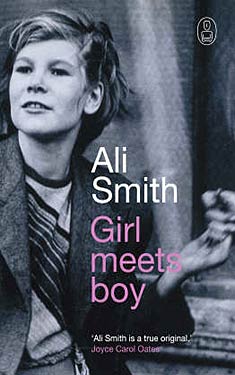Ali Smith
Completed 1/13/2017, reviewed 1/13/2017
4 stars
Girl Meets Boy is part of a series of books that are
retellings of famous myths. There are
books in this collection by A.S. Byatt and Margaret Atwood, among others. This book is a riff on the myth of Iphis and
Ianthe from Ovid’s Metamorphoses. While
not exactly a retelling, it plays on the story of a girl raised as a boy until
her wedding day. In the story, we get
girl meets boy, girl meets girl, and girls take on corporate greed. It’s interesting, interestingly written, and
very satisfying.
 The myth of Iphis is a little more complicated than my one
liner in the opening paragraph. It’s the
story of a poor couple. The woman gets
pregnant. As she approaches delivery
time, her husband tells her that if the baby is a boy, that would be
great. If it’s a girl, he’ll have to
kill her because they can’t afford a girl.
The woman prays to Isis. The goddess’s
response is to bear the child and if it’s a girl, raise it as a boy. The woman does, naming the girl Iphis which
is both a boy and a girl’s name. All is
well for the longest time. Iphis
develops a friendship with a beautiful little girl named Ianthe. They fall in love. Then their fathers arrange a marriage. At the news, Iphis panics because she can’t
truly meet Ianthe’s needs as a woman.
She prays to Isis who hears her pleas and changes her into a man in time
for the marriage to be successful. This
is the metamorphosis of this story in Ovid’s collection.
The myth of Iphis is a little more complicated than my one
liner in the opening paragraph. It’s the
story of a poor couple. The woman gets
pregnant. As she approaches delivery
time, her husband tells her that if the baby is a boy, that would be
great. If it’s a girl, he’ll have to
kill her because they can’t afford a girl.
The woman prays to Isis. The goddess’s
response is to bear the child and if it’s a girl, raise it as a boy. The woman does, naming the girl Iphis which
is both a boy and a girl’s name. All is
well for the longest time. Iphis
develops a friendship with a beautiful little girl named Ianthe. They fall in love. Then their fathers arrange a marriage. At the news, Iphis panics because she can’t
truly meet Ianthe’s needs as a woman.
She prays to Isis who hears her pleas and changes her into a man in time
for the marriage to be successful. This
is the metamorphosis of this story in Ovid’s collection.
Girl Meets Boy is the story of two sisters. Both work for Pure, a company the sells
overpriced bottled water. Anthea is a
dreamer, she hates her corporate job.
Imogen, the more pragmatic sister, loves her job and helps develop the
name for the product. Their company is
threatened by a person who goes by the name of Iphis, who writes anti-corporate
graffiti slurs that are the bane of Pure.
Anthea falls for Iphis and Imogen is threatened by her. The rest of the book is about how the sisters
resolve their issues around Iphis and Pure.
The book is written in an avant-garde sort of style, without
quotations, with a lot of inner dialogue, with the narrative bouncing between
the sisters. It’s a little disconcerting
at first, but easy to adapt to. The style
set a tone for me that the story was a little different itself, where gender
and gender identity may be fluid. Smith
does a wonderful job turning stereotypical gender roles on their heads. She also does an incredible job describing
the homophobia that goes on in Imogen’s head while she goes out for a jog.
I give this book four out of five stars. The writing is really terrific and the
character development is masterful for such a short book. It’s not exactly fantasy, but it is an interpolation
of a fantasy. It was nominated for a
Tiptree award and ended up on many best of lists for gender studies and LGBTQ
content. While it doesn’t make me want
to run out and read the other myth books in the series by this publisher, it
does make me want to read more by the author.
No comments:
Post a Comment